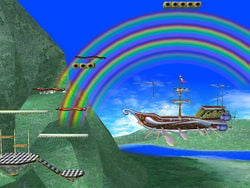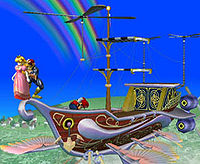Rainbow Cruise: Difference between revisions
SonicSpeed48 (talk | contribs) m (→Trivia) |
No edit summary Tag: Mobile edit |
||
| Line 5: | Line 5: | ||
|image = [[Image:Rainbow Cruise.jpg|250px|Rainbow Cruise]] | |image = [[Image:Rainbow Cruise.jpg|250px|Rainbow Cruise]] | ||
|caption = [[Image:MarioSymbol(preBrawl).png|50px]] | |caption = [[Image:MarioSymbol(preBrawl).png|50px]] | ||
|universe = | |universe = {{uv|Mario}} | ||
|games = ''[[Melee]]''<br/>''[[Brawl]]'' | |games = ''[[Melee]]''<br/>''[[Brawl]]'' | ||
|hometo = '''Melee:'''<br/>{{SSBM|Mario}}<br/>{{SSBM|Bowser}}<br/>'''Brawl:'''<br/>{{SSBM|Mario}}<br/>{{SSBB|Bowser}}<br/>{{SSBB|Peach}}<br/>{{SSBB|Luigi}} | |hometo = '''Melee:'''<br/>{{SSBM|Mario}}<br/>{{SSBM|Bowser}}<br/>'''Brawl:'''<br/>{{SSBM|Mario}}<br/>{{SSBB|Bowser}}<br/>{{SSBB|Peach}}<br/>{{SSBB|Luigi}} | ||
Revision as of 15:31, October 2, 2014
| Rainbow Cruise | |
|---|---|
 File:MarioSymbol(preBrawl).png | |
| Universe | Mario |
| Appears in | Melee Brawl |
| Availability | Starter (Melee and Brawl) |
| Crate type | Presents (Brawl only) |
| Tracks available | In Melee: Rainbow Cruise In Brawl: Rainbow Cruise (Melee) Princess Peach's Castle (Melee) Bolded track must be unlocked |
| Article on Super Mario Wiki | Rainbow Ride |
Rainbow Cruise (レインボークルーズ, Reinbō Kurūzu), also known as Rainbow Ride, is a stage that appears in Super Smash Bros. Melee and Super Smash Bros. Brawl. It is based off the "Rainbow Ride" stage from Super Mario 64. It is also one of Mario's home stages, and it is his stage in All-Star Mode, along with any of his teammates, as well as Bowser's stage in All-Star Match 1 of Melee's Event Match.
Stage description
The battle starts off on a flying ship that is facing left. The ship has four propellers on the backside, three propellers on top, one on the front and two on the back, and six giant paddles, which make it fly. The anchor hangs off the bow. The ship is flat in the center, but not on the sides. The bow of the ship is just a bit higher than the deck. The stern is clearly higher than the rest of the ship, including the bow. It is wide enough to fit two characters. The stern increases the height of the back of the boat, which can help characters who can wall-grapple. In the middle of the boat is the mast of the ship. It has two levels to fight on. The space between the middle platform and the deck is slightly larger in comparison to the space between the top platform and the middle. The top platform is also shorter than the middle one. It is just large enough to fit Bowser. After about thirty seconds, the ship will crash into the next segment of the stage and sink. When the ship sinks, the characters will have to battle on the strange floating platforms that follow. The platforms are different and feature a rotating axle platform, flying carpets, and falling blocks. The stage moves in a clockwise order and at the end, downward-pointing arrows that flash red will appear. They indicate that all players should descend to the lower parts of the stage before the camera zooms down. Those who do not make it to the boat, which is waiting below, can be KO'd off the top off the screen. The cycle continues from there.
Name confusion
While the Western localization version of the Super Mario 64 stage's name is "Rainbow Ride," the original Japanese version's is "Rainbow Cruise." The appearance of the Japanese name in the initial North American release of Melee seemed to be an oversight by the localization team and appeared as "Rainbow Ride" in both the PAL release and later North American copies of the game. It also appeared listed as "Rainbow Ride" in North American demos of Brawl, seeming to establish it as the "correct" Western name. Oddly enough, the stage's name in the retail release of Brawl in North America appears as "Rainbow Cruise". In the retail release of the PAL version however, the name appears as Rainbow Ride. CrappyCaptureDevice has also revealed in one of his "History Behind Super Smash Bros." videos that, through a GameShark, if one chooses a stage that they wish to start on (the stages won't have their actual names; instead, they will have either Japanese or roughly translated names, if not names that simply refer to the type/theme of the stages), Rainbow Ride will be shown as Rainbow Cruise.
Tournament legality
Rainbow Cruise was allowed in the past during the early stages of the Melee and Brawl metagames; although it was a scrolling stage, it had a predictable pattern and was thus allowed by many tournament organizers. However, it has now been almost universally banned in notable tournaments in both games. This is because the stage has ungrabbable ledges, disappearing platforms, and winding, non-linear passages throughout the entire cruise. This creates massive problems for characters with either poor to mediocre recoveries or slow and sluggish aerial maneuvering. The stage greatly favors characters with good air mobility and jumping ability, allowing some already top-tier characters to almost guarantee a win on this stage (such as Jigglypuff in Melee and Meta Knight in Brawl), and overcentralizes keeping up with the stage instead of actually fighting with the opponent.
Origin
This stage is from Super Mario 64's 15th level, Rainbow Ride. In Super Mario 64 there is a giant floating boat. The boat is made mostly out of wood and has wings for oars, but the boat only remains stationary. On the boat are strong gusts of wind, Bob-ombs, a Lakitu, and a cannon that Mario can shoot himself out of. The boat also has a tall mast with no sail. In this stage in Melee and Brawl, the boat has been greatly changed and scaled down. The boat has also been designed differently. The mast of the boat has been shortened, and there is now an extra platform. The boat now has a door towards the back and propellers that are connected to these wires on the boat. The boat is also no longer stationary as it flies across the stage. Despite these changes the boat retains its wings for oars and how the ship is made mostly out of wood.
In Super Mario 64, flying carpets are a means of transportation. When Mario jumps on a carpet the carpet would start to move along a rainbow trail. If Mario were to jump off of the carpet, it would continue to fly until it disappears. When the carpet reaches the end of the trail it simply falls. In this stage, the carpets move when a player jumps on them. If a player jumps off of a carpet, it disappears as it did in Super Mario 64. The carpets do seem to follow some form of a pre-determined path, but when the carpets reach the end of the "path" they don't fall; they instead flash for a few seconds and then vanish. The design of the carpets is also retained from Super Mario 64.
In Super Mario 64, there is a seesaw like platform that rises on one side and lowers on the other depending on where Mario stands. In this stage, a seesaw-like platform can be seen towards the upper left, but the platform is designed differently and has been scaled down. Also from Super Mario 64 is a giant pendulum-like swing that swings side to side. This pendulum-like platform appears in this stage, but it is designed differently. In Super Mario Bros. 3, there are platforms called Donut Lifts. Donut Lifts are platforms that fall down when a player stands on them for too long. These Donut Lifts also appear in Super Mario 64. The Donut Lifts in this stage works the same as they did Super Mario Bros. 3 and are designed to resemble the ones in Super Mario 64. Inside Princess Peach's castle in Super Mario 64 are black and white checkered floors. Some of the platforms in this stage have checkered platforms. In Super Mario 64's Rainbow Ride, the stage is high above the clouds and land can be seen. In this stage, however, the ground can be seen. [1]
The music for this stage is a remixed version of Super Mario 64's Rainbow Ride and the Underwater Theme from Super Mario Bros. [2]
Trivia
- During the first part of the boat ride, it is possible to jump out of sight, onto a platform above the boat, avoiding the fights below. The only draw back is taking damage being outside the screen.
- It is impossible to fall through the magic carpets. The carpets also only rise diagonally upward to the right.
- In Melee, a character was able to jump through the bottom of the donut lifts, but not drop through. However in Brawl, characters can no longer pass through the donut lifts in any way.
- If Pokémon Trainer is used on this stage in Brawl, he will stand on a special magic carpet in the background that is otherwise not present.
- If one stands at the edge of the teeter totter, (near top of screen) one will not slide off when it tilts. Instead, the character will shake repeatedly until he or she jumps off or when it disappears. Video can be seen here.
- Warp Stars never appear on this stage. If the Warp Star is the only item turned on via Item Switch, all the crates and capsules that appear will be explosive or empty.
Gallery
| Stages in Super Smash Bros. Melee | |
|---|---|
| Starter stages | Brinstar · Corneria · Fountain of Dreams · Great Bay · Green Greens · Icicle Mountain · Jungle Japes · Kongo Jungle · Mushroom Kingdom · Mute City · Onett · Pokémon Stadium · Princess Peach's Castle · Rainbow Cruise · Temple · Venom · Yoshi's Island · Yoshi's Story |
| Unlockable stages | Battlefield · Big Blue · Brinstar Depths · Final Destination · Flat Zone · Fourside · Mushroom Kingdom II · Poké Floats |
| Dream Land · Kongo Jungle · Yoshi's Island | |




